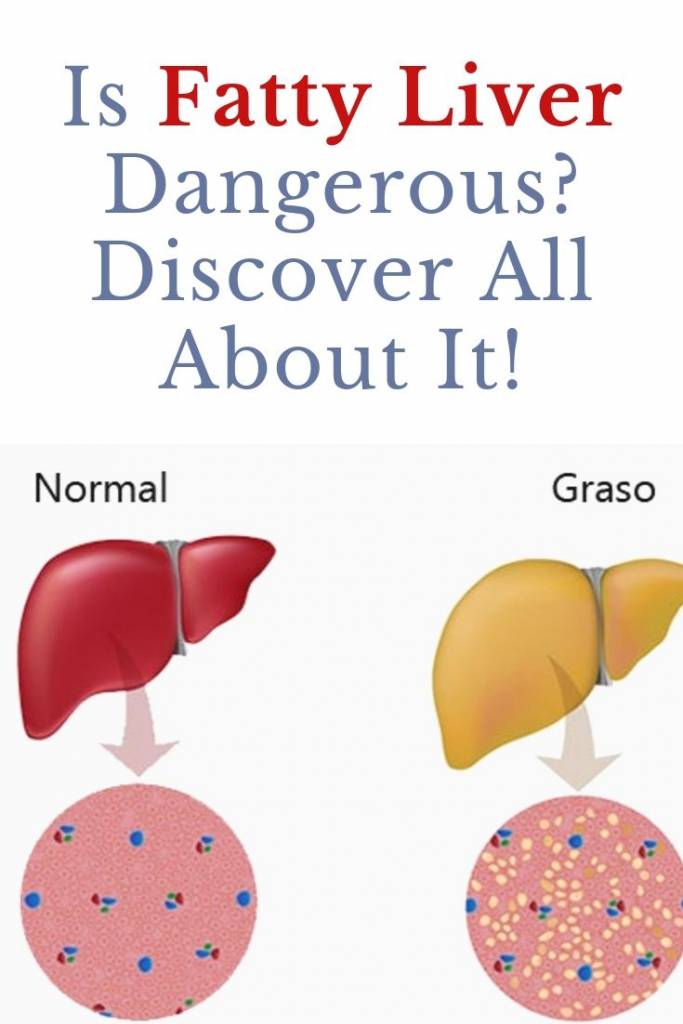Is fatty liver dangerous? Can it really lead to cancer? Discover all the info on this disease and see what you need to do in case you are diagnosed with it!
The liver is the largest organ in the body, if it does not work properly it cannot completely process fats and begins to accumulate them, causing fatty liver.
The liver, as you may as well know, is one of the most important organs of the human body. Among its many functions, the fat metabolization during the digestion of food in the body and the elimination of toxins stands out. Therefore, liver diseases such as fatty liver should alert us.
When the liver does not work properly, it cannot completely process fats and begins to accumulate them, resulting in fatty liver or steatosis.
Fatty liver is a liver disease characterized by the accumulation of fatty acids and triglycerides in liver cells. It is often said that it is a “silent” disease, since it is usually asymptomatic, which without a timely diagnosis can lead to cirrhosis or liver cancer.
Causes
When talking about the causes of this disease, it should be noted that there are no known clear causes of fatty liver. However, some risk factors are known:
- Overweight.
- Diabetes.
- High cholesterol.
- High triglycerides.
- Arterial hypertension.
- Unhealthy diet.
- Excessively rapid weight loss.
- Intestinal diseases.
Age is also considered a risk factor, with middle-aged or older people being at greater risk for this disease.
Treatments with certain medications such as corticosteroids and some cancer medications.
Types
When we talk about fatty liver disease, we distinguish two main types:
- Alcoholic fatty liver disease.
- Non-alcoholic fatty liver
It happens when the liver cannot metabolize fats correctly, causing them to be stored in the tissues. As the name implies, this type of fatty liver is not caused by alcohol consumption. There are two types:
Simple fatty liver: in this type there is fat in the liver but little or no inflammation or damage to the cells of this organ. Generally, this type does not cause liver damage or complications.
Non-alcoholic liver steatosis: in this case there is inflammation and damage to liver cells. This inflammation and damage can cause fibrosis or scarring of the liver.
Alcoholic fatty liver
As the name implies, this type of fatty liver is due to high alcohol consumption. One of its functions is to break down the ingested alcohol to eliminate it from the body.
However, the decomposition process can generate substances that can damage liver cells, cause inflammation and weaken the body’s natural defenses. Therefore, the more alcohol the patient consumes, the more damage they will cause to the liver.
The alcoholic fatty liver is the earliest stage of alcoholic liver disease and is followed by alcoholic hepatitis and cirrhosis.
Symptoms
Often, this asymptomatic disease, that is, has no symptoms. However, among the usual symptoms of fatty liver are:
- Pain of the abdomen, in the upper right part.
- General discomfort.
- Tiredness and chronic fatigue.
- Feeling of heaviness.
- Jaundice, although less commonly.
Is fatty liver dangerous? Can it lead to cancer?
The main question is: is fatty liver dangerous? Well, the fatty liver, when not treated or controlled, represents one of the main risk factors when developing liver cancer. This is because when the patient does nothing to remove excess fat from the liver, it continues to increase, which can compromise both the health of the organ and that of the individual.
However, it is important to make clear that a risk factor does not mean that the person is going to get the disease. Generally, it usually results from the combination of more risk factors as well as unhealthy habits that increase this risk.
In the case of liver cancer, it is very important to take into account the person’s lifestyle, both food and physical activity. This is because one of the main causes of fatty liver is food.
Therefore, although we cannot say that fatty liver causes liver cancer, it is an important risk factor. Other risk factors for this cancer are:
Hepatitis: The viruses that cause hepatitis are capable of infecting the liver, and can lead to cirrhosis.
Obesity and diabetes: both conditions increase the amount of fat deposited in the liver.
Cirrhosis: damage to liver cells derives from the healing of liver tissue, considered the most acute deterioration of this organ.
Gender and age: this disease usually attacks a person older than 65 years, being the men most likely to suffer from it.
Environmental factors: among which are exposure to toxic substances or consumption of food rich in toxins.
Diagnosis
Because it is often an asymptomatic disease, it is not easy to diagnose fatty liver. In general, an individual has this disease if they obtains abnormal results in tests they perform for other reasons. Some of the tests used to detect fatty liver are:
Blood tests to assess the levels of transaminase and bilirubin.
Ultrasound to determine the brightness of the liver: the brighter, the more damaged it is.
Liver biopsies: they are necessary to know the degree of disease in which the liver is
Treatment
You can treat the fatty liver with relative ease. In general, the first indication is to lose weight. Therefore, a combination of healthy eating and regular exercise is key. Although we must bear in mind that the weight loss should not be sudden.
Read more: If You Have Diagnosis Of Fatty Liver, Detoxify It With These 2 Drinks!
It is also essential to eliminate any medication that affects the disease, as well as eliminate the consumption of any type of alcoholic beverage. Finally, consuming vitamin E and thiazolidinediones (substances that treat diabetes), have a positive effect on the treatment of the liver.
Don’t forget to SHARE the answer to the question is fatty liver dangerous with your friends and family on your social networks!

